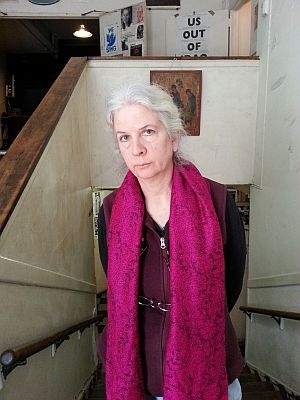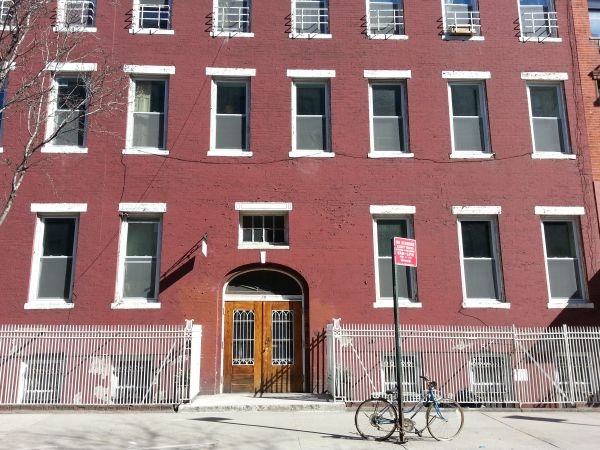 Dorothy Day was a Catholic activist who co-founded the Catholic Worker movement.
Dorothy Day was a Catholic activist who co-founded the Catholic Worker movement.
She spent decades serving the poor and opposing war. Her only child settled in Vermont and today several of her grandchildren live here.
One of them has been dividing her time between Vermont and a "house of hospitality" that Day started in New York City.
Day started out as a journalist but after converting to Catholicism, she dedicated her life to opposing war and serving the poor.
Day explains, "If anyone comes to you hungry, you don’t say to him, ‘Go, be thou filled.’ ‘Go, be warm.’ You go ahead and see to it that he does get what he needs. You can’t pass the buck that way. You can’t go ahead and say, ‘Go to this agency or that.’ You’re supposed to immediately reply to the need of that person."
Day was equally outspoken in opposing war, even when so-called "just wars" against Fascism were waged against Franco and Hitler.
Even though some of her stands were controversial, the church is considering Day for sainthood. Last November the Conference of American Catholic Bishops endorsed the cause of sainthood.
But she was also a mother. Day’s only child, a daughter named Tamar, settled on a 15-acre farm in Perkinsville and had nine children of her own. It’s a different world from Manhattan’s East Village.
On East 3rd Street, a few doors down the block from the Hell’s Angels clubhouse, there’s a four-story red brick building that once was Day’s home.
Mary House has a soup kitchen and a shelter for homeless women. The poor can also get free clothing here.
"This is a very important part of what we do, clothing the naked," says Martha Hennessy, the 57 year-old granddaughter of Dorothy Day, who has taken up some of her grandmother’s work. Hennessy stays here at Mary House for up to a month at a time when she’s not back in Perkinsville or off speaking at Catholic parishes and colleges.
 According to Hennessy, "We have house shifts, which consists of cooking, cleaning, sitting and talking to people, getting lunch ready for the soup line. We have anywhere from 30 to 70 women coming for meals. It’s very similar to my previous life in terms of being a mother, in terms of being a daughter, in terms of being a sister."
According to Hennessy, "We have house shifts, which consists of cooking, cleaning, sitting and talking to people, getting lunch ready for the soup line. We have anywhere from 30 to 70 women coming for meals. It’s very similar to my previous life in terms of being a mother, in terms of being a daughter, in terms of being a sister."
Hennessy and her siblings have a longstanding connection to the Catholic Worker movement. Many have visited the Catholic Worker farm in upstate New York. Hennessy has memories of visiting Mary House as a young girl. "I was a very shy kid. So, it was very nerve-wracking for me as a kid. The homeless are people dealing with mental illness, addiction and so, yes, it was a very scary thing for me to enter into that world, especially being a young child growing up in isolation in Vermont."
Hennessy was raised as a Catholic but says her connection to the Church was severed when her father left the family. She was drawn back to the church after her son joined the military, and after she met a man in Hawaii who had been part of the Catholic Worker movement.
"I started attending church on a regular basis and just found myself weeping all the time," Hennessy says.
In Vermont, Hennessy had been working as an occupational therapist at local public schools and the VA Hospital in White River Junction. But her opposition to American military intervention in Iraq and Afghanistan and her reconnection to her Catholic faith led her back to the work of her grandmother, who died in 1980.
"It’s been hard. I’ve left my family, my home," she notes. "I found I could no longer stay at home, I could no longer work and pay war taxes."
The Catholic Worker commitment to non-violence is very much in evidence at Mary House where walls are covered with portraits of Dorothy Day and Martin Luther King Jr., as well as a banner calling for the shutdown of the American military prison at Guantanamo.
"I think that she did a marvelous job of bringing together all of these different strands, this model of being faithful, practicing the works of mercy, non-violence, voluntary poverty and hospitality," says Hennessy. She understood clearly what the words of Jesus meant and she faithfully tried to follow that and live accordingly."
Some of the same causes embraced by the new pope, Francis. Hennessy last saw her grandmother here at Mary House the year before she died. Hennessy was in her early 20s then, so she has vivid memories of her grandmother. "She was a regular grandmother. She was an ordinary grandmother. And then in other ways I understood her to be extraordinary. She would come to visit us in Vermont. She would make us work more than our mother would make us work. I remember that. She was more disciplined and more focused than my mother was."
And yet Hennessy is ambivalent about her grandmother’s nomination for sainthood. Many in the Catholic Worker community believe she is a saint already, Hennessy says. She would rather that the bishops should follow what Dorothy Day was trying to teach, especially her stand against war. Hennessy thinks the Catholic Church needs to come to Dorothy Day, something Hennessy is doing by volunteering at Mary House in New York City.
Note: Martha Hennessy is currently in Amman, Jordan, helping to set up an occupational therapy clinic for kids with learning disabilities. She plans to be there for six months.